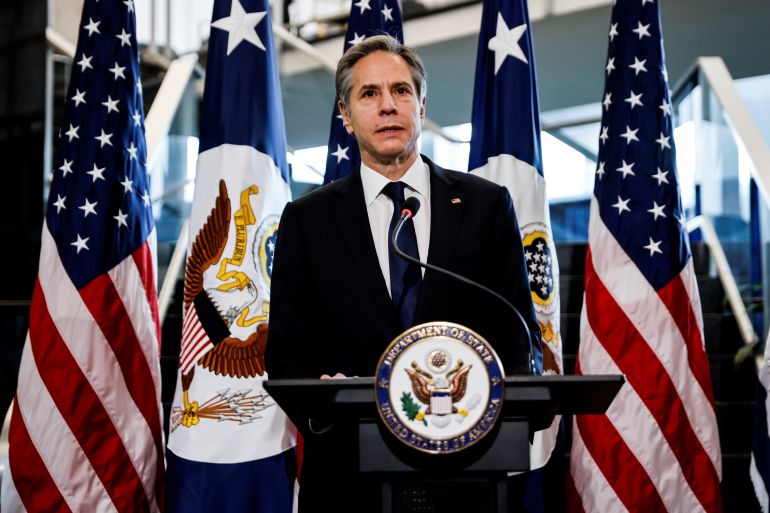US Secretary of State Blinken says ‘world is watching’
On the first day on the job, Blinken promised to boost foreign service morale and promote ‘American leadership’ globally.

United States Secretary of State Tony Blinken, on his first day on the job, said the “world is watching” how the administration of President Joe Biden will change course from the “America first” approach of former President Donald Trump.
Speaking during a small welcome ceremony on Wednesday, a day after being confirmed by the US Senate, Blinken vowed to rebuild the ranks and morale of the US foreign service, which saw depletion during Trump’s presidency.
Keep reading
list of 3 itemsBiden administration to review US-Taliban deal
US Senate confirms Blinken as Biden’s secretary of state
“The world is watching us intently right now. They want to know if we can heal our nation,” Blinken said.
“They want to see whether we will lead with the power of our example and if we will put a premium on diplomacy with our allies and partners to meet the great challenges of our time.”
Since his swearing-in, Blinken, the most senior Biden cabinet member to be confirmed thus far, has made a flurry of calls to his counterparts in neighbouring and allied countries, including Canada, Mexico, Japan and South Korea.
At press conference later on Wednesday, Blinken said the desire to have the US back as an reliable ally was “almost palpable”.
“What I’ve picked up from those conversations already is a very, very strong desire for the United States to be back in the room. Back at the table. Working with them on many, many common challenges we face,” he said.
Blinken, a deputy secretary of state in the administration of former President Barack Obama, is known to have a more interventionist outlook than Biden, for whom he has been a longtime adviser.
Houthi designation
Also on Wednesday, Blinken laid out several Trump administration policies that he said he plans to review, including the recent designation of Yemen’s Houthi rebels as a “foreign terrorist organisation”.
Aid groups and the United Nations have warned that the sanctions that accompany that designation would inhibit aid deliveries to Yemeni civilians in Houthi-controlled areas and worsen an already dire humanitarian crisis in the war-torn country.
Blinken said the Houthis “committed an action of significant aggression” in taking over the Yemeni capital, Sanaa, in 2014 and have committed “human rights abuses and other atrocities”.
But he also said the US-backed coalition fighting the rebels, led by Saudi Arabia and the United Arab Emirates, has “also contributed to what is by many estimates the worst humanitarian crisis in the world today”.
Biden had earlier promised to “reassess” Washington’s relationship to Riyadh and end US support for the Saudi-led coalition in Yemen.
Blinken also reiterated a promise to build on normalisation deals between Israel and the UAE, Bahrain, Sudan and Morocco, which were brokered by the Trump administration, but said he would first review “any commitments that may have been made in securing those agreements”.
Russia, China
On the US-Taliban deal reached under Trump, Blinken said the administration is working to “make sure that we fully understand the commitments that the Taliban has made, as well as any commitments that we’ve made”.
He added that Ambassador Zalmay Khalilzad will remain the US’s Special Representative for Afghanistan Reconciliation.
Blinken said the US would continue to confront Russia on the treatment of opposition activist Alexey Navalny and his supporters, as well as on allegedly meddling in the 2020 elections and reports of Russian bounties on US soldiers in Afghanistan.
He said the US would also to continue to take a hard line on China, while trying to reinforce “cooperative” aspects of the relationship, which he called “arguably the most important relationship that we have in the world”.
Iran deal
One of the most pressing US foreign policy issues facing the Biden administration is the US-Iran relationship, which sank to new lows during the Trump administration’s “maximum pressure” strategy against the Iranian government.
Iran has said it would only come back to a multilateral 2015 nuclear agreement if the US lifts Trump-era sanctions. The former US president in 2018 unilaterally withdrew from the deal, which saw Iran agree to curb its nuclear programme in exchange for a lifting of sanctions.
The Biden administration has said Tehran must make the first move by coming back into compliance with the agreement before any progress can be made.
Blinken on Wednesday gave little indication there would soon be a breakthrough in the impasse.
“We are a long ways from that point. Iran is out of compliance on a number of fronts,” he said. “And it would take some time should it make a decision to do so for it to come back into compliance and time for us then to assess whether it is meeting its obligations.”